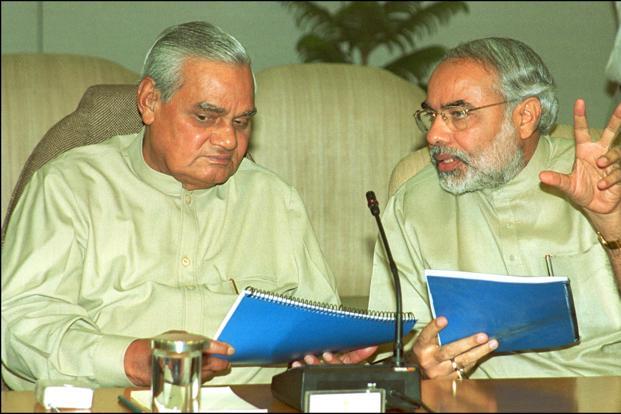Here are some examples of how BJP, under the leadership of Mr Vajpayee, implemented the agenda of Hindutva
By M Ghazali Khan www.siyasat. net news desk
While in the Indian national political circles and international media rich tributes have been paid to the late former Indian Prime Minister, Atal Bihari Vajpayee. Several social media activists have reacted with strong language reminding those who have been praising the late leader of his connivance with the extremists and his Hindutva background as well.
One may have political and ideological differences with someone but this does not warrant anyone to use uncivilised and abusive language against someone who has held the top job of a nation’s Prime Minister especially on his death. Such behavior is highly deplorable.
However, at a time when well-known and not so well-known commentators have been remembering and praising him for his perceived and ‘principled’ politics, flexible attitude and his willingness to cooperate even with his staunchest political opponents, it becomes essential to do some reality checks and put the record right. After all Vajpayee was not an ordinary person. He played an important role in the politics of the country and dealt with some painful facts, that are part of India’s political history and are now being tried to be whitewashed need to be highlighted and corrected as well.
Like Narendra Modi, who rode to power on the stormy anti-Muslim waves created by him in his state, Gujarat, and who oversaw the massacre of more than 2000 Muslims, Mr Vajpaee too flew over the storm of anti-Muslim fervour created by his confidant and right-hand man L. K. Advani in the 80s. This is how British journalist and writer William Dalrymple felt the atmosphere in Delhi in 1990:
“In the German winter of 1929 it was the political failure of the Weimar Republic and the onset of hyper-inflation that ushered in the rise of National Socialists Party. In India the winter of 1990 a similar course of events has brought to prominence the Hindu fundamentalist Bharatiya Janata Party (or BJP). In the 1984 election the BJP took only two seats. Last year they took 88. When Chandra Shekhar’s rag-tag government falls (and few expect it to survive much beyond the spring of 1991, most commentators predict that the BJP will sweep the whole northern India… The man behind BJP’s rise to power is L.K. Advani… BJP’s revolution has been preceded by a mysterious distribution of tens of thousands of inflammatory cassettes… The cassettes openly encouraged anti-Muslim violence: ‘Our Motherland cries out for succour, cries out for martyrs who will cut the [Muslims] enemies of the nation to pieces’ says one I found in a market near my house. ‘We cannot suffer anymore the descendants of Babur [founder of the Mogul dynasty]. If this means a blood bath, then let there for once be a blood bath’… In Delhi drawing rooms fascism has become fashionable; educated people will tell you without embarrassment that it is about time the Muslims are disciplined—that they are dirty and fanatical, that they breed like rabbits. While chattering classes chatter, others take direct action. As I write, Old Delhi is in flames as Hindus and Muslims battle it out in the streets” (The Spectator, 8 December 1990).
There is not a single instance to prove that Mr Vajpayee either tried to stop or even disapproved Advani’s provocative speeches and the mischief he was spreading in his so called Rathyatra. Far from this, as the situation required, he himself made speeches rousing communal passions.
Here are some examples of how BJP, under the leadership of Mr Vajpayee, implemented the agenda of Hindutva:
Not only during the tenure of BJP Chief Minister Kalyan Singh was the Babri Mosque demolished in 1992 but in his second tenure in 1997 he also imposed the singing of Sarasvati Vandana and Vande Mataram in government schools and colleges, a practice no successive government has been able to reverse. Did Vajpayee ji stop it?
In 2000 BJP’s UP Chief Minister Ram Prakash Gupta, created an atmosphere of terror and harassment. In addition to taking several extreme pro-Hindutva measures he also tried to pass UP Religious Places Bill that would have made it impossible for Muslims even to repair or make even minor improvements in a mosque or madrassa without the permission of a commissioner. Does anyone know if Vajpayeeji came into action and advised his lieutenants not to indulge in this poisonous game?
In 2001 a Report of Group of Ministers, headed by L.K. Advani, on ‘Reforming the National Security System’ branded Indian Muslims as a security risk. Following the commands of the Central Government, UP Government went a step further and issued a circular that said, ‘Every SHO will prepare a register of Muslims and Sikh families living in his perspective area; details of outsiders coming in his area should also be maintained and they be strictly watched…’ Anything on record that would show that Vajpayeeji at least showed his displeasure at these steps being taken?
In 2003, when BJP was not even in absolute majority and this time Atal Bihari Vajpayee-led NDA Government honoured RSS leader V.D. Sarvarkar in parliament and unveiled his portrait in the Central Hall leaving all secular politicians making feeble protests.
The press conference in Ahmadabad addressed by Mr Vajpayee in the wake of Gujarat Massacre of 2002 in which he had asked Narendra Modi to follow ‘Raj Dharam’ and treat every citizen equally is often cited as an example of his belief in equality of all. The fact, however is that such a robust reaction of Mr Vajpayee was his worry about how he would respond if he was questioned about Gujarat Massacre during a sojourn he was going to take to Syria. ‘I am ashamed’ he said when he met the victims of the massacre in Ahmadabad. ‘I don’t know what face I will take to some of the Muslim countries I have to visit’
By his very un-RSS style and emotive speech Vajpayee succeeded in impressing the world but as far as Indian Muslims were concerned they knew, and were not even expecting, that the brutal bloodshed would not even get mentioned by any Muslim ruler let alone any concern being expressed by any of them. And this is what exactly happened. This gave Mr Vajpayee enough courage to reveal his real face and brand Indian Muslims as ISI agents. Answering a question as to whether there was an ISI hand behind the Godhra carnage, he said, ‘Investigations are still on into the matter, but prima facie it looks like a planned attack than a spontaneous attack’. (Times of India 4 April 2002).
Vajpayee is being described as a great patriot for whom country’s interests came first and who supported the Congress’s external affairs policies despite his dislike for the party and its ideology. Yes when it came to national interests he showed exemplary and praiseworthy broadmindedness. But in his definition of national interests Muslims had no place. He was a RSS trained politician, the RSS whose founder M S Golwalkar, in his book We or Our Nationhood Defined, had said:
‘the foreign races … must either adopt the Hindu culture and language, must learn to respect and hold in reverence Hindu religion, must entertain no idea but those of the glorification of the Hindu race and culture i.e. of the Hindu nation and must lose their separate existence to merge in the Hindu race, or may stay in the country, wholly subordinated to the Hindu Nation, claiming nothing, deserving no privileges, far less any preferential treatment – not even citizens’ rights. There, at least should be, no other course for them to adopt. We are an old nation; let us deal, as old nations ought to and do deal, with the foreign races, which have chosen to live in our country.’
Otherwise:
‘German race pride has now become the topic of the day. To keep up the purity of the Race and its culture, Germany shocked the world by her purging the country of the Semitic Races – Jews. Race Pride at its highest has been manifested here. Germany has also shown how well near impossible it is for races and cultures, having differences going to the root, to be assimilated into one united whole, a good lesson for us in Hindusthan [India] to learn and profit by.’
































